Here’s my list of recommended Broadway, off-Broadway, and out-of-town shows, updated weekly. In all cases, I gave these shows favorable reviews (if sometimes qualifiedly so) in The Wall Street Journal when they opened. For more information, click on the title.
BROADWAY:
• An American in Paris (musical, G, too complex for small children, most performances sold out last week, reviewed here)
• Fool for Love (drama, R, most performances sold out last week, closes Dec. 13, reviewed here)
• Fun Home (serious musical, PG-13, virtually all performances sold out last week, reviewed here)
• A Gentleman’s Guide to Love & Murder (musical, PG-13, many performances sold out last week, closes Jan. 17, reviewed here)
• Hamilton (musical, PG-13, all performances sold out last week, reviewed here)
• Hand to God (black comedy, X, absolutely not for children or prudish adults, closes Jan. 3, reviewed here)
• The King and I (musical, G, perfect for children with well-developed attention spans, reviewed here)
• Matilda (musical, G, reviewed here)
• Les Misérables (musical, G, too long and complicated for young children, reviewed here)
• Spring Awakening (musical, PG-13/R, closes Jan. 24, reviewed here)
OFF BROADWAY:
• Alfred Hitchcock’s The 39 Steps (comedy, G, ideal for bright children, remounting of Broadway production, original production reviewed here)
• Eclipsed (drama, PG-13, closes Nov. 29, reviewed here)
• The Fantasticks (musical, G, suitable for children capable of enjoying a love story, reviewed here)
• The Flick (serious comedy, PG-13, too long for young people with limited attention spans, reviewed here)
IN CHICAGO:
• The Price (drama, PG-13, closes Nov. 22, reviewed here)
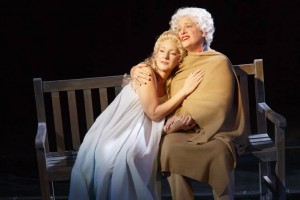 CLOSING SOON OFF BROADWAY:
CLOSING SOON OFF BROADWAY:
• First Daughter Suite (serious musical, PG-13, extended through Nov. 22, reviewed here)
CLOSING NEXT WEEK IN CHICAGO:
• The Tempest (Shakespeare, PG-13, closes Nov. 8, reviewed here)
CLOSING SATURDAY IN NIAGARA-ON-THE-LAKE, ONTARIO:
• Sweet Charity (musical, PG-13, reviewed here)
CLOSING THIS WEEKEND IN ASHLAND, OREGON:
• Sweat (drama, PG-13, closes Saturday, reviewed here)
• Guys and Dolls (musical, G, closes Sunday, reviewed here)
CLOSING THIS WEEKEND OFF BROADWAY:
• A Midsummer Night’s Dream (Shakespeare, PG-13, remounting of Hudson Valley Shakespeare Festival production, closes Saturday, original production reviewed here)
• Unseamly (serious comedy, R, closes Sunday, reviewed here)




 A week after bringing home
A week after bringing home 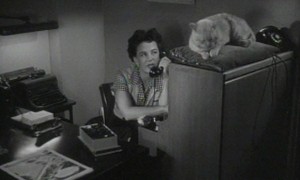 This distinction isn’t as widely understood as it should be. Most new technologies make our lives easier without changing them other than superficially. The compact disc, for example, was a convenience, not a revolution. Unlike the iPod, it didn’t alter our relationship to the world of music. The answering machine, by contrast, really did transform the way in which we used the telephone by making it possible to screen incoming calls. As soon as that possibility became a reality, the place of the telephone in daily life underwent a profound change, and never changed back.
This distinction isn’t as widely understood as it should be. Most new technologies make our lives easier without changing them other than superficially. The compact disc, for example, was a convenience, not a revolution. Unlike the iPod, it didn’t alter our relationship to the world of music. The answering machine, by contrast, really did transform the way in which we used the telephone by making it possible to screen incoming calls. As soon as that possibility became a reality, the place of the telephone in daily life underwent a profound change, and never changed back.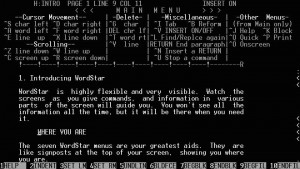 I was born in 1956, twenty-seven years after my mother, which means that I lived through the early years of the rise of personal computing. Indeed, my initial exposure to screen-based electronic word processing, as I
I was born in 1956, twenty-seven years after my mother, which means that I lived through the early years of the rise of personal computing. Indeed, my initial exposure to screen-based electronic word processing, as I 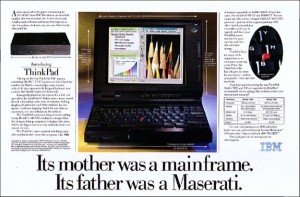 The next major upheaval in my computing life came in 1995, when I bought my first laptop. By then I’d started working in earnest on
The next major upheaval in my computing life came in 1995, when I bought my first laptop. By then I’d started working in earnest on 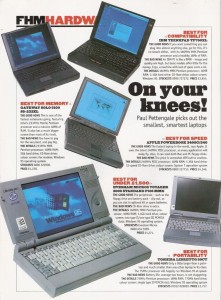 It helps that I’ve never been scared by the prospect of change. In 2005 I
It helps that I’ve never been scared by the prospect of change. In 2005 I